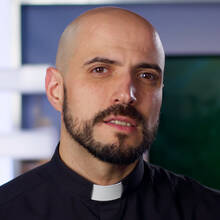Ask anyone connected with Jesuits to describe what characterizes us, and invariably this is the response you will get: finding God in all things. In his remarks at the closing Mass of the Outreach 2024 conference, Gregory A. Schenden, S.J., director of campus ministry at Georgetown University, sent the congregation off with a slight variation of this phrase, as he encouraged the 350 L.G.B.T.Q. persons and allies who had gathered for the weekend conference “to seek and to find God in all things.”
The addition of “seek” is, in fact, a more faithful translation of what Ignatius actually wrote at the start of the Spiritual Exercises: “buscar y hallar la voluntad de Dios,” which directly translates as “to seek and to find God’s will.”
The care that Father Schenden took to include “to seek” reminds me that finding God in all things is an active pursuit, one that requires us to rummage for God in our lives, rather than simply allowing ourselves to happen upon God (and after all, God will happen upon us anyway).
There was another reason why Father Schenden’s use of “to seek” caused a lump to swell in my throat. Two weeks before, I had been at the National Eucharistic Congress in Indianapolis to help cover the event for America. When I arrived there, the registration lines were snaking around the Indiana Convention Center, as tens of thousands sought entry to the five-day event. The sheer volume of people overwhelmed me, and I began to shut down. I recalled my misgivings about this gathering, given its expense and the emphasis on Eucharistic adoration (to be sure, a form of prayer I find profoundly meaningful) almost as if it were superior to the celebration of the Mass itself.
But as the event began, my misgivings were at once confirmed and thrown into confusion. Two weeks earlier in that same space, a massive 8.2-foot-deep, two-million-gallon pool had been installed for the U.S. Olympic swim team trials. Now an altar stood, surrounded by a diverse gathering of the faithful, from cardinals to deacons, and from consecrated religious women and men to devoted laypeople. Atop this altar, a four-foot-tall golden monstrance housing a seven-inch consecrated host was flanked by four equally tall candlesticks, two on either side. Every light in the stadium converged upon the monstrance, all while the congregation was led in praise and worship, singing: “I want more of you God…. No place I’d rather be than here in your love.”
Bishop Andrew H. Cozzens of Crookston, Minn., who has been spearheading the National Eucharistic Revival, prayed as he stood before the congregation: “Lord, it is good to be here. We are here for you, Lord.” And with these words, I was turned away from my reporter’s notebook toward prayer. “We want to be changed,” he continued. “We want you to transform us into true disciples, missionary disciples, people filled with the joy of the Gospel.”
Later that night, I tried to reconcile my qualms about a rock-concert-like experience with the palpable faith that permeated the room, as people fell to their knees before the Blessed Sacrament. And the next day, I again took inspiration from Bishop Cozzens’s words on that first night as he led us in prayer: “Lord, help my unbelief.”
I moved from one talk to another and through the exhibition hall, until eventually I was drawn to take my place in the large room where hundreds of priests and penitents were celebrating the sacrament of reconciliation. Over the next three hours, as I heard the confessions of my siblings in Christ, I was struck by the depth of their faith and the sincerity of their repentance. As I administered the sacrament, I felt the weight of my own doubts and fears slowly lifting, and I knew that I was not only a minister of God’s mercy but also a recipient of it.
Bishop Cozzens’s words helped me transcend initial criticisms and engage with the congress in a fresh way. We were on a spiritual retreat, not attending a concert or mega-event but a prayer-filled, God-inspired gathering of 60,000 people from across the United States and beyond. We were there united in our desire for spiritual renewal and greater union with God.
But there is another part to this revival that still needs to be tested. Our Christian life is measured by its fruit; our devotion begs action in God’s world that others may be drawn into the mystery of God. Action—not simply adoration—is what’s required of us. The final phase of this third year of the National Eucharistic Revival launches the Walk With One campaign, an initiative to seek out those who have grown disenchanted and disillusioned with the church and bring them back. Now what’s left for us to do is as Cardinal Luis Antonio Tagle, who was appointed the pope’s delegate to the Congress, proclaimed in the final words of his homily at the closing Mass: “Go! Go! Go!”







